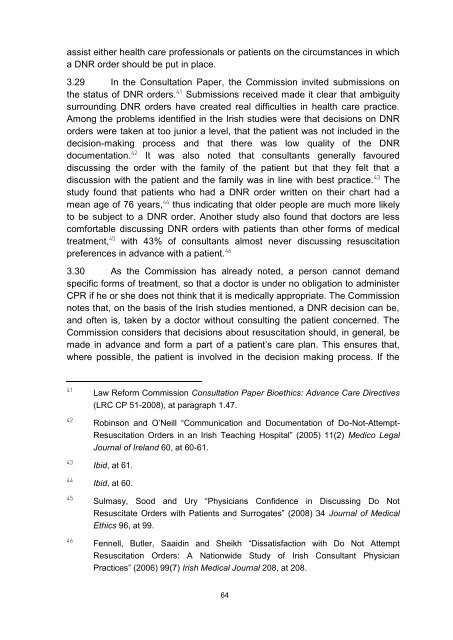Report on Bioethics: Advance Care Directives - Law Reform ...
Report on Bioethics: Advance Care Directives - Law Reform ...
Report on Bioethics: Advance Care Directives - Law Reform ...
Create successful ePaper yourself
Turn your PDF publications into a flip-book with our unique Google optimized e-Paper software.
assist either health care professi<strong>on</strong>als or patients <strong>on</strong> the circumstances in whicha DNR order should be put in place.3.29 In the C<strong>on</strong>sultati<strong>on</strong> Paper, the Commissi<strong>on</strong> invited submissi<strong>on</strong>s <strong>on</strong>the status of DNR orders. 41 Submissi<strong>on</strong>s received made it clear that ambiguitysurrounding DNR orders have created real difficulties in health care practice.Am<strong>on</strong>g the problems identified in the Irish studies were that decisi<strong>on</strong>s <strong>on</strong> DNRorders were taken at too junior a level, that the patient was not included in thedecisi<strong>on</strong>-making process and that there was low quality of the DNRdocumentati<strong>on</strong>. 42 It was also noted that c<strong>on</strong>sultants generally favoureddiscussing the order with the family of the patient but that they felt that adiscussi<strong>on</strong> with the patient and the family was in line with best practice. 43 Thestudy found that patients who had a DNR order written <strong>on</strong> their chart had amean age of 76 years, 44 thus indicating that older people are much more likelyto be subject to a DNR order. Another study also found that doctors are lesscomfortable discussing DNR orders with patients than other forms of medicaltreatment, 45 with 43% of c<strong>on</strong>sultants almost never discussing resuscitati<strong>on</strong>preferences in advance with a patient. 463.30 As the Commissi<strong>on</strong> has already noted, a pers<strong>on</strong> cannot demandspecific forms of treatment, so that a doctor is under no obligati<strong>on</strong> to administerCPR if he or she does not think that it is medically appropriate. The Commissi<strong>on</strong>notes that, <strong>on</strong> the basis of the Irish studies menti<strong>on</strong>ed, a DNR decisi<strong>on</strong> can be,and often is, taken by a doctor without c<strong>on</strong>sulting the patient c<strong>on</strong>cerned. TheCommissi<strong>on</strong> c<strong>on</strong>siders that decisi<strong>on</strong>s about resuscitati<strong>on</strong> should, in general, bemade in advance and form a part of a patient‘s care plan. This ensures that,where possible, the patient is involved in the decisi<strong>on</strong> making process. If the414243444546<strong>Law</strong> <strong>Reform</strong> Commissi<strong>on</strong> C<strong>on</strong>sultati<strong>on</strong> Paper <strong>Bioethics</strong>: <strong>Advance</strong> <strong>Care</strong> <strong>Directives</strong>(LRC CP 51-2008), at paragraph 1.47.Robins<strong>on</strong> and O‘Neill ―Communicati<strong>on</strong> and Documentati<strong>on</strong> of Do-Not-Attempt-Resuscitati<strong>on</strong> Orders in an Irish Teaching Hospital‖ (2005) 11(2) Medico LegalJournal of Ireland 60, at 60-61.Ibid, at 61.Ibid, at 60.Sulmasy, Sood and Ury ―Physicians C<strong>on</strong>fidence in Discussing Do NotResuscitate Orders with Patients and Surrogates‖ (2008) 34 Journal of MedicalEthics 96, at 99.Fennell, Butler, Saaidin and Sheikh ―Dissatisfacti<strong>on</strong> with Do Not AttemptResuscitati<strong>on</strong> Orders: A Nati<strong>on</strong>wide Study of Irish C<strong>on</strong>sultant PhysicianPractices‖ (2006) 99(7) Irish Medical Journal 208, at 208.64
















